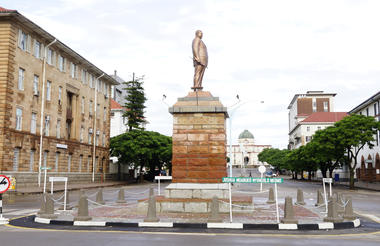Tucked within Bulawayo, the second-largest city in Zimbabwe, is a small Jewish community, once home to thousands of people, a synagogue and the Carmel School, with hundreds of students.
The synagogue is still active, the population maintains the local cemetery and the Carmel School is still attended, but none of the students are Jewish. The Jewish community has shrunk drastically over the last half century, with fewer than 100 people remaining.
A handful of people from Great Neck want to help ensure its survival.
“You could see that this [community] was thriving,” Sean Jensen, a rabbi with Great Neck Synagogue and a teacher at North Shore Hebrew Academy, said in an interview. “And they were very proud Jews.”
Jensen hopes to lead a fundraising tour, “South Africa Through Jewish Eyes,” to Zimbabwe and South Africa in January to benefit the Bulawayo Jewish community.
He said the effort builds on the work of Great Neck Rabbi Marvin Tokayer, who has led “Jewish eyes” historical tours to remote Jewish communities in Southeast Asia, India and the Far East for decades and founded the Foundation for Remote Jewish Communities.
It is also the most recently added tour, sparked by a phone call from Mervyn Trappler, who grew up in Bulawayo, to both rabbis about setting up an annual tour to Zimbabwe and South Africa so people can appreciate both southern Africa and the Jewish community there.
Trappler described growing up in Zimbabwe as “an absolute delight” and an “absolute privilege.” Among his strongest memories, he said, were the beautiful purple skies and the freedom that came with such a safe and open community.
“There’s such a feeling of arriving home and it’s such an experience,” Trappler said on Tuesday. “Africa is just a phenomenal place to have been born and grown up. You just experience every emotion.”
Trappler recalled a time when the Jewish community in Bulawayo peaked in the 1970s, with thousands of people calling the area home. But following a civil war, which lasted from 1964 to 1979, Trappler said, authoritarian politics and policies like land distribution have spurred many to flee.
Now most of the help for Bulawayo’s Jewish community comes from outside charitable organizations rather than the government, Trappler said – and it looks like the community, whose origins in the area can be traced to pioneers moving there in the 1890s, will likely “disappear in the next 15 years.”
“We had country clubs, other schools, synagogues – they’re all overgrown with bush and trees,” Trappler said. “It’s like a time warp. It’s there but it’s now decrepit.”
Jensen said that in an earlier group tour to Bulawayo, he saw a community that is thriving despite its small population. Bulawayo’s Jews also hosted a community-wide Shabbat dinner for everyone and showcased “strong Jewish values,” he said, which was just one example of their “warm, welcoming and appreciating” attitude.
“Everybody walked out saying the thing that got them the most about this trip was how warm and welcoming this community was and you could see how the community’s thriving,” Jensen said.
According to a trip itinerary, the 12-day trip for 2019 would feature talks with Jewish community leaders in Bulawayo and trips to other landmarks like Hwange National Park, Victoria Falls and Cape Town.
Ultimately, Trappler said visiting southern Africa would be worthwhile for anyone.
“Even if one isn’t going for the Jewish history side of it, it’s really something to see that part of Africa,” Trappler said. “It really is.”



